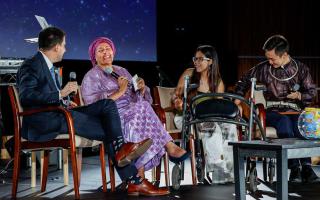Business Operations Strategy BOS 2.0 Practitioner Online Training
Business Operations Strategy (BOS) 2.0 Practitioner Online Training is a brand-new online course developed by UNSSC in close partnership with the United Nations Development Coordination Office. It aims to establish a common understanding of the BOS and provide support to practitioners engaged in the development and implementation of the BOS 2.0 in their countries.
“THE UNITED NATIONS NEEDS TO BE NIMBLE, EFFICIENT AND EFFECTIVE. IT MUST FOCUS MORE ON DELIVERY AND LESS ON PROCESS; MORE ON PEOPLE AND LESS ON BUREAUCRACY”
António Guterres - Secretary-General of the United Nations
The BOS focuses on joint business operations with the purpose of eliminating duplication, leveraging the common bargaining power of the UN, and maximizing economies of scale. The BOS was created in 2012 as a response to the call for simplified and harmonized processes and procedures.
The benefits of common services are becoming increasingly evident. The global Business Operations Strategy 2.0 (BOS), launched in October 2019, aims to deliver on the commitment for all UN Country Teams to develop an enhanced common business operations strategy by the end of 2020, in support of more effective programme delivery on the 2030 Agenda for Sustainable Development.
The BOS will be also leveraged to meet the target set for all UNCTs to establish common back offices.
This joint course between UNSSC and the Development Coordination Office is part of the ambitious capacity development effort towards the establishment of a single team to support services for the entire UNCT in areas relating to administration, finance, human resources, information and technology, logistics, and procurement.
By completing this self-paced training programme, participants will also gain practical skills in all steps of BOS 2.0 dealing with resistance and completing a change impact analysis.
Upon successful completion of the programme, participants will be able to:
- Contribute or lead the BOS in their country;
- Deliver a presentation to the Operations Management Team (OMT) on how a BOS is developed;
- Know how to use the BOS platform;
- Have basic skills on engaging, dealing with a change environment, and resistance;
- Have the basic skills required to qualify for the training of trainer’s programme in BOS 2.0.
BOS 2.0 Practitioner Online Training is a dedicated structured learning path. It is a self-paced course offering micro-learning experience across seven learning modules. Each module contains multiple lessons with activities that promote the consolidation and reflection on course learnings. Scenario-based learning exposes participants to UN examples, real-life challenges and tasks of a BOS practitioner.
The learning experience is structured around micro-learning modules, videos from subject matter experts, BOS Online Platform tutorials, downloadable PDF guides, checklists, infographics and more. Additionally, course participants will be able to consolidate takeaways through reflective practices and interaction with other participants via discussion forums, and other activities.
Each module is estimated to require approximately three hours of study time to complete at your own pace.
The BOS 2.0 Practitioner Online Training is hosted on the UNSSC Blue Line platform. The programme consists of the following 7 modules, each covering different topics related to practical and soft skills:
- The UN Development System Reform
- BOS 2.0 Governance
- The Kick-Off and Stock Take
- The Opportunity Analysis
- The Planning Framework and Sign-Off
- Communication, Engagement, and Working with Resistance
- Change Impact Analysis
Participants will receive a certificate upon successful completion of the learning path.
Operations staff from UN agencies based in country and regional offices; programme staff are welcome if they have basic operational knowledge in one or more lines of operation (Procurement, Finance, HR, ICT, Logistics or Administration) and an interest to support the BOS strategy in the country.
Free for UN staff



